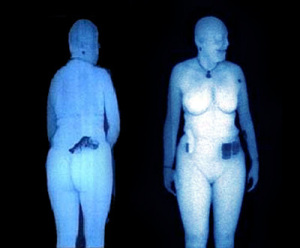by
Brendon Nafziger, DOTmed News Associate Editor | November 15, 2010
Airport scanners designed to detect non-metallic weapons and explosives have sparked an uproar over radiation concerns, with two pilots unions warning their members to avoid the X-ray scans.
The Transportation Security Administration is installing two types of scanners in airports across the country. One type, called millimeter-wave technology, uses millimeter-wavelength radio waves to create a 2D image of the passenger. As this involves nonionizing radiation, similar to what's produced by a cell phone, most scientists say there are few known health risks.
But the other scanner uses backscatter X-ray technology, which involves tiny doses of ionizing radiation.



Ad Statistics
Times Displayed: 656
Times Visited: 5 Fast-moving cardiac structures have a big impact on imaging. Fujifilm’s SCENARIA View premium performance CT brings solutions to address motion in Coronary CTA while delivering unique dose saving and workflow increasing benefits.
Last week, two unions representing more than 16,000 pilots advised their members to steer clear of the scans.
"Based on currently available medical information, [U.S. Airline Pilots Association] has determined that frequent exposure to TSA-operated scanner devices may subject pilots to significant health risks," Capt. Mike Cleary, president of the USAPA, said in a letter to members.
In a letter to his group's members, Allied Pilots Association president David Bates said "no pilot at American Airlines should subject themselves to the needless privacy invasion and potential health risks caused by the [Advanced Imaging Technology] body scanners."
But despite the concerns, many experts, including the American College of Radiology, have dismissed the risks from the scanners as negligible. TSA says one scan is equivalent to the cosmic radiation a passenger would receive for only two minutes of air travel. And the ACR says a passenger would need 1,000 scans using backscatter technology to equal the dose received by just one chest X-ray.
"The ACR is not aware of any evidence that either of the scanning technologies that the TSA is considering would present significant biological effects for passengers screened," the radiologist group said in a statement.
But some scientists note that though on an individual level the risk of cancer is slight, on a population-level or for vulnerable populations there could be cause for concern.
"If you think of the entire population of, shall we say a billion people per year going through these scanners, it's very likely that some number of those will develop cancer from the radiation from these scanners," David Brenner, director of the Center for Radiological Research at Columbia University and a professor of radiation biophysics, told CNN.
And in April, four scientists with the University of California, San Francisco petitioned the White House to undertake an "urgent second independent evaluation" of the technology. The scientists said the comparisons with cosmic radiation received during a flight and from a chest X-ray were misleading because the scanners involve low beam energies delivered mostly to the skin.

